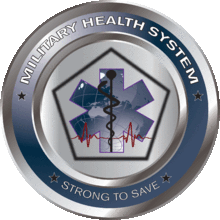 | |
| Agency overview | |
|---|---|
| Headquarters | Falls Church, VA |
| Employees | 137,000 |
| Annual budget | $50 billion |
| Agency executive |
|
| Website | health |
The Military Health System (MHS) is the internal health care system operated within the United States Department of Defense that provides health care to active duty, Reserve component and retired U.S. Military personnel and their dependents.[1]
The missions of the MHS are complex and interrelated:[2]
- To ensure America’s 1.4 million active duty and 331,000 reserve-component personnel are healthy so they can complete their national security missions.
- To ensure that all active and reserve medical personnel in uniform are trained and ready to provide medical care in support of operational forces around the world.
- To provide a medical benefit commensurate with the service and sacrifice of more than 9.5 million active duty personnel, military retirees and their families.
The MHS also provides health care, through the TRICARE health plan, to:[3]
- active duty service members and their families,
- retired service members and their families,
- Reserve component members and their families,
- surviving family members,
- Medal of Honor recipients and their families
- some former spouses, and
- others identified as eligible in the Defense Enrollment Eligibility Reporting System.
Such care has been made available since 1966, (with certain limitations and co-payments), through the Civilian Health and Medical Program of the Uniformed Services (CHAMPUS) and now through the TRICARE health plan. In October 2001, TRICARE benefits were extended to retirees and their dependents aged 65 and over.[1] On Oct. 1, 2013, the Defense Health Agency replaced the TRICARE Management Activity.
The MHS has a $50+ billion budget and serves approximately 9.5 million beneficiaries.[4] The actual cost of having a government-run health care system for the military is higher because the wages and benefits paid for military personnel who work for the MHS and the retirees who formerly worked for it, is not included in the budget. The MHS employs more than 144,217 in 51 hospitals, 424 clinics, 248 dental clinics and 251 veterinary facilities across the nation and around the world, as well as in contingency and combat-theater operations worldwide.[5]
- ^ a b Best, Richard A. Jr. (2005-05-05). "Military Medical Care Services: Questions and Answers" (PDF). Congressional Research Service. Retrieved 2008-05-23.
- ^ "About the Military Health System". Military Health System. Retrieved 2019-11-25.
- ^ "Eligibility | TRICARE". www.tricare.mil. Retrieved 2019-11-25.
- ^ "Health.mil". Archived from the original on 2014-07-02. Retrieved 2014-12-03.
- ^ "Annual Evaluation of the TRICARE Program". Military Health System. Retrieved 2019-11-25.
